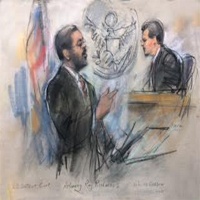Rockwood Criminal Lawyer, Michigan
Sponsored Law Firm
-
 x
x

Click For More Info:
-
Richards & Associates, PLLC
200 East Big Beaver Road Troy, MI 48083» view mapCriminal Defense Accomplished Criminal Defense Attorney
If you face criminal charges, you deserve an experienced defense lawyer who has a reputation for winning the tough cases.
800-844-5250
Eugene Ferguson
Bankruptcy & Debt, Criminal, Divorce & Family Law, Estate
Status: In Good Standing Licensed: 41 Years
Thomas Richard Ruddy
Other, Family Law, Divorce & Family Law, Criminal
Status: In Good Standing Licensed: 10 Years
James K. Kersten
Criminal, Consumer Rights, Consumer Bankruptcy
Status: In Good Standing Licensed: 43 Years
 Ray Richards Troy, MI
Ray Richards Troy, MI AboutRichards & Associates, PLLC
AboutRichards & Associates, PLLC Practice AreasSpecializations
Practice AreasSpecializations
